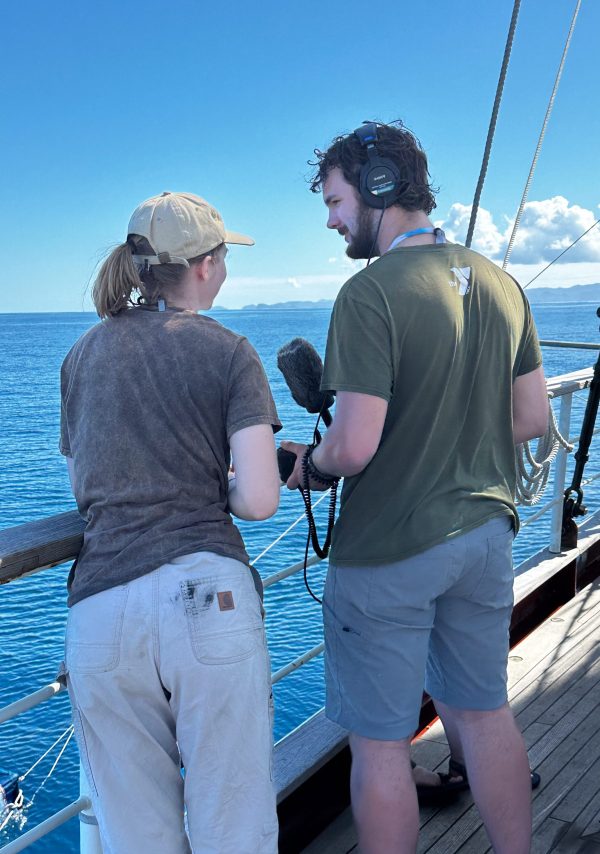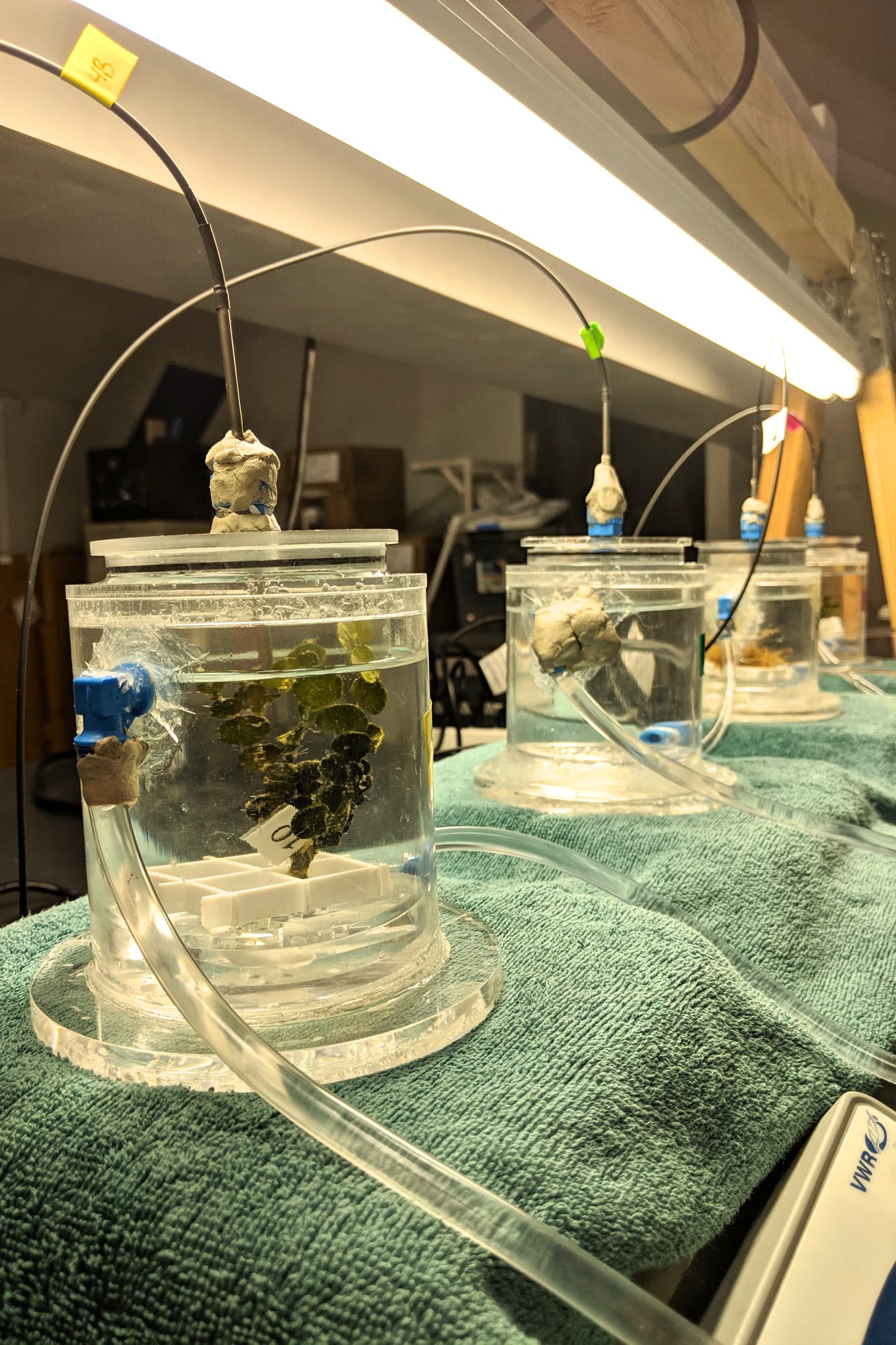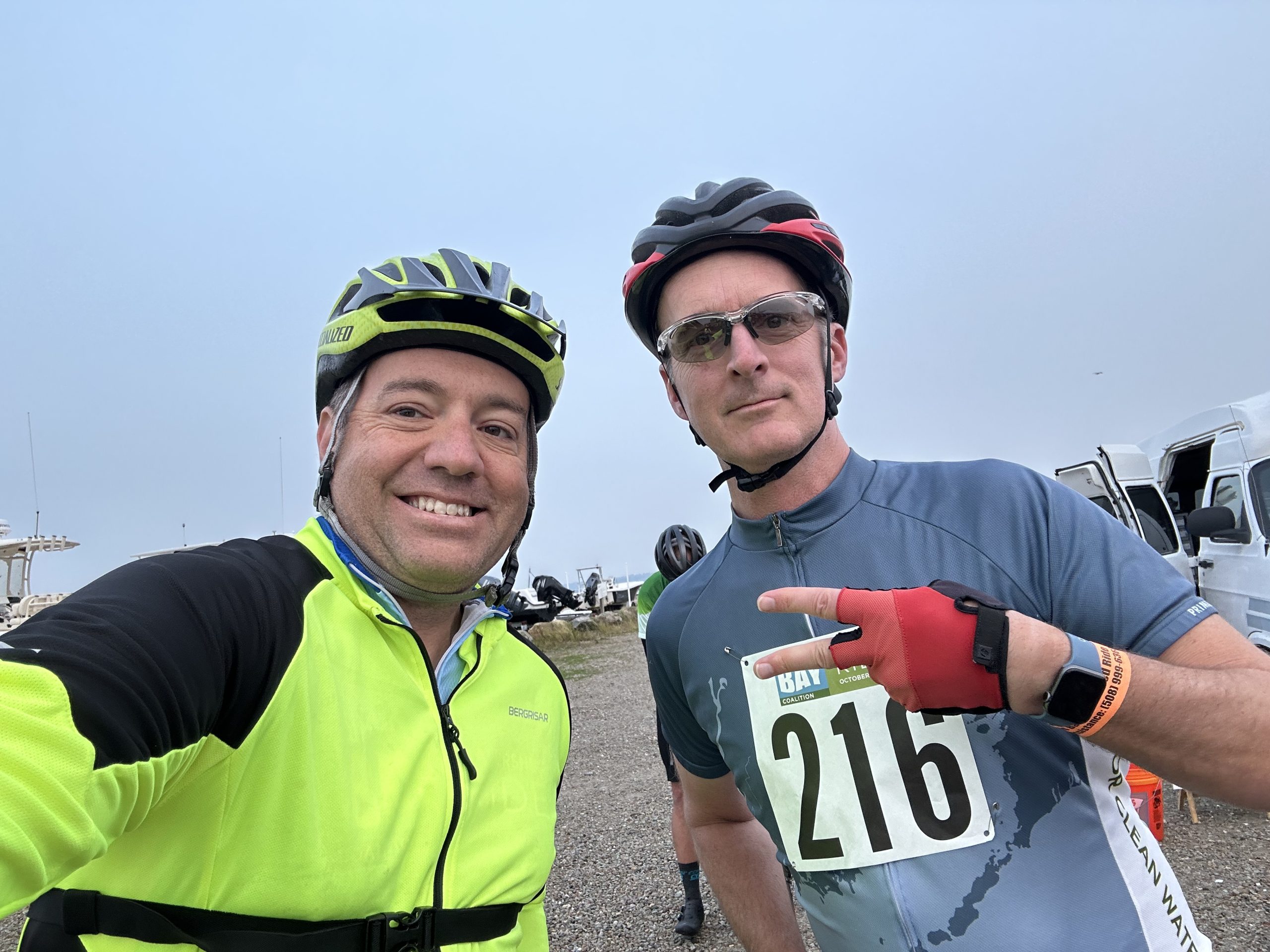SEA faculty have formed many professional collaborations in scholarly research and in education and outreach activities that both enhance SEA programs and contribute to the academic community at large.
In addition, SEA vessels serve as “ships of opportunity” to deploy instruments, provide valuable open ocean samples and supply data to collaborators from institutions around the world. SEA vessels routinely travel through regions not frequented by other research vessels, providing the opportunity to collect data in observation-sparse or remote areas, and to build long-term data sets on annually-repeated cruise tracks. The SSV Corwith Cramer, operating in the North Atlantic Ocean and Caribbean and Mediterranean seas, and the SSV Robert C. Seamans, operating in the North and South Pacific Oceans, are equipped with sophisticated oceanographic instrumentation and laboratory equipment that allow students, faculty, and visiting researchers alike to collect high quality oceanographic data. SEA routinely submits data to national and international archives for use by the broader oceanographic research community.
Research collaborations
Anthony Andrady, North Carolina State University and Helix Science
– degradation and impacts of plastic marine debris
David Bethoney, University of Massachusetts Dartmouth
– seafloor surveys for plastic marine debris
Lanna Cheng, Scripps Institution of Oceanography
– ecology of the marine insect Halobates
Genevieve Davis, NOAA Northeast Fisheries Science Center
– marine mammal passive acoustic monitoring
Vicki Ferrini, Lamont-Doherty Earth Observatory
– bathymetric surveys near Hunga Tonga Hunga Ha’apai, Tonga
James Garvin, NASA Goddard Space Flight Center
– sediment sampling, aerial surveys, and GPS ground-truthing at Hunga Tonga Hunga Ha’apai, Tonga
Heather Handley Goldstone, WCAI National Public Radio
– survey design for ascertaining attitudes on single-use plastics
Annette Govindarajan, Woods Hole Oceanographic Institution
– biodiversity and systematics
Tobias Kukulka, University of Delaware
– wind-driven turbulent mixing of microplastic marine debris
Joel Llopiz, Woods Hole Oceanographic Institution
– biogeography of tuna larvae within Phoenix Islands Protected Area (PIPA)
Lindsay Martin, Texas A&M University
– Sargassum community diversity
National Center for Ecological Analysis and Synthesis (NCEAS), Marine Debris Working Group
– sources, abundance, distribution and impacts of marine debris
Patricia Pinto da Silva, NOAA Northeast Fisheries Science Center
– survey design for ascertaining attitudes on single-use plastics
Giora Proskurowski, MarqMetrix
– abundance, distribution and wind-driven vertical mixing of microplastic marine debris
Christopher M. Reddy, WHOI
– abundance, distribution and characterization of microplastic marine debris
Randi Rotjan, Boston University
– program development for Protecting the Phoenix Islands summer program
– collaborator on tuna and deep-water research within Phoenix Islands Protected Area (PIPA)
Amy Siuda, Eckerd College
– Sargassum distribution and abundance, mobile fauna community structure, and molecular diversity
Dan Slayback, NASA Goddard Space Flight Center
– sediment sampling, aerial surveys, and GPS ground-truthing at Hunga Tonga Hunga Ha’apai, Tonga
Madelyn Taylor, Barnard College
– Sargassum mobile fauna community structure
Waitt Institute Blue Halo Initiative
– monitoring coral reef health in the Caribbean
Education and outreach collaborations
Falmouth Water Stewards (Jenny Allen, Jill Holdren, Danie Kinkade, Sierra Munoz and Alan Robinson)
– ocean plastic reduction outreach and education for businesses, schools and NGOs through the Trash Shouldn’t Splash initiative
Kim Beddall, Whale Samana, Dominican Republic
– humpback whale monitoring in Samana Bay and on Silver Bank
Bermuda Institute of Ocean Sciences
– port stop excursions for SEA Semester: Marine Biodiversity and Conservation
Liliana Betancourt, Sanctuary for the Marine Mammals of the Dominican Republic
– humpback whale monitoring in Samana Bay and on Silver Bank
Marta Ferreira, University of the South Pacific, Fiji
– port stop excursions and community engagement for SEA Semester: Sustainability in Polynesian Island Cultures and Ecosystems
Reggie Meredith Fitiao and Su’a Fitiao Wilson, American Samoa
– Samoan cultural instruction and community engagement for SEA Semester: Sustainability in Polynesian Island Cultures and Ecosystems
Lennox Honychurch, Historian, Dominica
– port stop excursions and community engagement for SEA Semester: Colonization to Conservation in the Caribbean
Kāti Huirapa Runaka ki Puketeraki Māori group, New Zealand
– Otago region indigenous history, culture and environmental instruction as well as community engagement for SEA Semester: Global Ocean
Wendy McGuinness, McGuinness Institute, New Zealand
– port stop excursions and outreach opportunities for SEA Semester: Global Ocean
Clare Morrall, St. George’s University (Grenada)
– guest faculty for SEA Semester: Colonization to Conservation in the Caribbean
– undergraduate training programs for underrepresented populations
Na Korova Village, Suva, Fiji
– Polynesian navigation and sailing instruction onboard traditional vessels for SEA Semester: Sustainability in Polynesian Island Cultures and Ecosystems
National Institute of Water and Atmospheric Research (NIWA), New Zealand
– port stop excursions and outreach opportunities for SEA Semester: Global Ocean
Pacific Ridge to Reef Program, Tonga
– mangrove restoration and water quality monitoring service learning opportunities for SEA Semester: Sustainability in Polynesian Island Cultures and Ecosystems
Eunice Pongipongi, Nuku’alofa, Tonga
– Tongan culture and archaeology instruction as well as port stop excursions for SEA Semester: Sustainability in Polynesian Island Cultures and Ecosystems
Skip the Straw Falmouth (Petra Brienza, Kalea Holdren, Ursula Junker, Meredith Kinkade and Sadie Leveque)
– business and school engagement for reduction of ocean plastic pollution
Tammy Trott, Bermuda Department of Environmental Protection & Sargasso Sea Commission
– marine spatial planning & resource management instruction for SEA Semester: Marine Biodiversity and Conservation
University of the West Indies, Jamaica
– port stop excursions and community engagement for SEA Semester: Colonization to Conservation in the Caribbean
Vava’u Environmental Protection Association (VEPA), Tonga
– marine ecology instruction as well as reef survey and beach clean-up service learning opportunities for SEA Semester: Sustainability in Polynesian Island Cultures and Ecosystems
Waitangi Treaty Grounds, New Zealand
– New Zealand history and culture instruction as well as port stop excursions for SEA Semester: Global Ocean
Wharton Aresty Institute of Executive Education, University of Pennsylvania
– custom-designed at-sea programs to advance executive-level organizational leadership
Wharton Leadership Venture Program, University of Pennsylvania
– outdoor experiential leadership development opportunities (tall ship and small crew sailing) for MBA students
“Ship of Opportunity” collaborations
Argo network of profiling CTD floats, Pacific Marine Environmental Laboratory
– routinely deploy Argo floats on Pacific and Atlantic Ocean cruise tracks
Sarah Bury, National Institute of Water and Atmospheric Research, New Zealand
– collected phytoplankton and seawater samples from South Pacific waters for environmental stable isotope analyses
Tom Brough, Far Out Ocean Research Collective, New Zealand
– guest scientist, collected observations of cetacean habitat use and foraging ecology in New Zealand waters
Richard Camilli, Woods Hole Oceanographic Institution
– guest scientist, deployed custom instrumentation to detect underwater oil seeps in the Gulf of Mexico following the Deepwater Horizon oil spill
Census of Marine Zooplankton (CMarZ), a program of the Census of Marine Life
– contributed zooplankton samples from Atlantic and Pacific Oceans
Jeff Donnelly, Woods Hole Oceanographic Institution
– collected sediment cores and meteorological data in French Polynesia
Casey Dunn, Brown University
– collected Physalia physalis (Portuguese man o’war) for study of the morphology, evolution and development of siphonophores
Erica Goetze, University of Hawaii at Manoa
– collected zooplankton for population genetics studies
Kalina Grabb, Woods Hole Oceanographic Institution
– guest scientist, collected seawater samples and reef observations to study mechanisms of coral bleaching
Marta Guerra, University of Otago, New Zealand
– guest scientist, collected observations of cetacean habitat use and foraging ecology in New Zealand waters
Government of Kiribati
– collected bathymetric data for redefinition of Exclusive Economic Zone (EEZ) boundaries
International Census of Marine Microbes (ICoMM), a program of the Census of Marine Life
– contributed open ocean samples for genetic analysis of marine microbes
Kris Karnauskas, University of Colorado at Boulder
– collected meteorological data near remote Pacific islands to improve climate model parameterizations
Marine Geoscience Data System
– repository for published floating microplastics data collected in the North Atlantic Ocean, Caribbean Sea, and North and South Pacific Oceans
National Ocean Data Center (NODC)
– repository for CTD data collected in Atlantic and Pacific Oceans
Ocean Biogeographic Information System (OBIS)
– contributed biogeographic data for a variety of marine organisms
Ocean Genome Legacy
– contribute marine tissue samples and genomic information to a genome bank
Olga Pantos, Institute of Environmental Science and Research, New Zealand
– collected microplastics data from New Zealand waters for assessment of coastal marine pollution
Xavier Pochon, Cawthron Institute, New Zealand & Plankton Planet
– collected phytoplankton and zooplankton samples from South Pacific waters for metabarcode sequencing
Rolling Deck to Repository (R2R)
– contribute shipboard data collected in Atlantic and Pacific Oceans
SeaBASS, a NASA program
– repository for optical data collected in Atlantic and Pacific Oceans
S. Robbie Smith, Bermuda Aquarium Museum and Zoo
– guest scientist, collected Sargassum community fauna samples in North Atlantic Ocean
Hideshige Takada, Tokyo University of Agriculture and Technology
– collected ocean microplastics for analysis of Persistent Organic Pollutants (POPs)
Ulla von Ammon, Cawthron Institute and University of Auckland, New Zealand
– guest scientist, collected plankton and seawater samples for metabarcoding sequencing and stable isotope analyses



